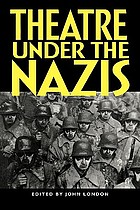From the book Theatre Under the Nazis, by John London (2000):
There was a section where they he summarized the number of legal productions of Shakespeare by play during the Nazi era. The results are fascinating. Now keep in mind these are productions across all of Germany, not individual performances. Shakespeare was apparently extremely popular.
Twelfth Night -135
Taming of the Shrew - 101
Hamlet - 94
Midsummer Night's Dream - 76
Much Ado About Nothing - 57
Comedy of Errors - 48
As You Like It - 47
London also mentioned the play King Lear, which had 4 performances in the 1932-33 season, 34 performances in 1933-34, and 98 performances in 1934-35. I wonder what it was about this play that was so attractive to German audiences.
What I find very fascinating about this list is the the type of plays that were popular. The more popular plays were not the plays that dealt with war, were not the history plays (well, obviously the Nazis couldn't approve of English history plays that celebrated English patriotism), they were not the deep thinking classic tragedies, either, aside from Hamlet, which we have already discussed has a long cultural connection to Germany.
I think the reason behind the popularity of these plays during the Nazi era is summed up by London in the following quote:
For every pro-Nazi or potentially critical production there were twenty stagings of comedies which had no ulterior motive other than amusement. His identity may have been German according to official dogma, but perhaps Shakespeare's overwhelming persona in the Third Reich was that of an entertainer. (p. 250)It seems then, that what Germans were looking for during this time was escapism, they went to the theatre to get away from the war-time conditions. Especially under the Nationalist Socialists, Germans needed and took any excuse to laugh. It is no wonder they wanted to see comedies and not plays like Macbeth, with so much killing and death. If they wanted to watch a mad man ruling a country they just read the newspaper.
London also discussed the play Merchant of Venice, which had 86 performances in 1933 alone, and was broadcast on the radio after Kristallnacht. This is probably the first play people think of when they think about Shakespeare plays and Nazis because of the Jewish character, Shylock and the way he is portrayed. But, surprisingly, this was not all that popular in Germany during the Nazi era, though there were some interesting performances.
 |
| A very menacing looking Jew. |
They did change the play so that Jessica does not marry Lorenzo -- the Nazis could not have interracial marriages, especially one with a Jew. Some versions added scenes that revealed that Jessica was adopted and therefore not a Jew, others had her go to her father's help and leave Lorenzo. Also, all references to Jews behaving in good ways were removed, all references of family love and duty, and Launcelot's line "most beautiful pagan, most sweet Jew" (II. 3.10-11).
It is also interesting to note that a production of Merchant of Venice was planned in 1946 in Frankfurt but due to widespread controversy it was indefinitely postponed. That would have been quite the performance to see, to see how Jews would have been treated in the year just after the war ended.
John London also described Jürgen Fehling's Richard III (1937), which had large sets and enormous space to reduce the physical stature of the actors, showing the insignificance of individuals compared to their environment. The limping and womanizing Richard was seen as a parody of Joseph Goebbels, the Nazi propaganda minister. As I previously mentioned, soldiers were dressed in costumes resembling Nazi uniforms.(Although a law in 1935 prohibited use of German military uniforms in theatre, photgraphs exist which prove these costumes did resemble SS uniforms.) Some reviews also made connections between the ghosts that haunt Richard of those he has had killed and those that Hitler ordered killed in the Night of Long Knives in 1934.
For this production, Fehling should have been fired, if not imprisoned or killed, but he was close friends (some maintain lovers) with Gustaf Gründgens, who was the head of the State Theatre in Berlin, appointed by Göring, and Gründgens threatened to quit if Fehling left.
From the book Theatre in the Third Reich, by Glen Gadberry (1995), about Fehling's Richard III, he wrote that not only did Werner Krauß have a club foot reminiscent of Goebbels, but he carried a six foot long broad sword, despite being only 5'7". "With it, Krauß laughed and frolicked his way through his machinations, a dangerous comedian with weapons he hardly knew how to use" (pg. 86).
Also, the final battle scene was cut. When Richard saw Richmond he said his line "My kingdom for a horse!" and collapsed, dead, on his sword. This seems to be more than slightly critical of Hitler and Goebbels, showing that in the end, they would have no power, no strength, no courage to fight. It is also eerily similar to what actually happened in the bunker in Berlin in 1945. Hitler, with his mistress (though some reports say they were married just hours before), and other important leaders, including Goebbels, committed suicide. Goebbels even gave his six children cyanide capsules, after sedating them, before he and his wife shot themselves. Rather than surrender to the Russians who were storming Berlin, and rather than be put on trial, or suffer themselves to be similarly desecrated, they killed themselves and ordered their bodies to be burned beyond recognition. I highly recommend the film Der Untergang (Downfall), which is about Hitler's last few months in Berlin. It is a powerful film, but very well done.
